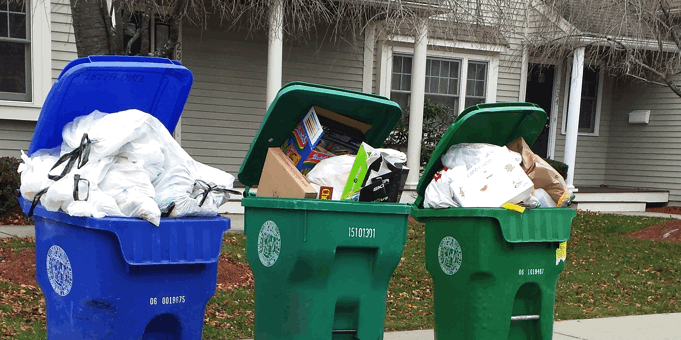Did you know that Newton’s trash goes to an incinerator, also known by the state as a “combustion facility” that burns the trash and turns it into energy? While this may sound like a great solution, the reality is that trash incineration is not a good environmental solution. The incinerators are typically located in or near lower income, environmental justice communities. While modern incinerators have equipment to limit the amount of contaminants such as nitrous oxide and sulfur dioxide that are released into the environment, studies show that the air surrounding these facilities is unhealthy and that those living in the vicinity suffer from higher rates of asthma and other conditions. In addition, about 30% of the trash by volume remains as highly toxic ash that must be disposed, and the ash landfills in Massachusetts are a further source of environmental contaminants.
It’s unlikely that we will free ourselves of the need for incinerators or landfills in the foreseeable future, but we can dramatically reduce what we throw out every week. According to the most recent study by the Massachusetts Department of Environmental Protection (MassDEP), we are throwing out a lot of materials that don’t belong in the trash—materials that are recyclable or compostable. Here is the analysis of the trash brought to Millbury Wheelabrator, Newton’s trash disposal contractor:

- 33.0% organic (food waste, compostable paper)
- 19.3% paper
- 16.0% plastic
- 3.4% metal
- 2.0% glass
- 7.7% construction and demolition materials
- 5.7% household hazardous waste
- 0.2% electronic waste
- 12.6% other materials (including 5.2% textiles)
Much of these materials can be recovered and recycled into new materials. What can we do?
- First rule of thumb is to reduce what you throw out in the first place.
- Reuse and repair are next.
- When those are not possible, recycle and recycle right. See below for ways to do it well.
Food waste. Food waste is the single largest material that doesn’t belong in the trash. You can compost at home with your own compost bin, subscribe to the Black Earth Compost pickup service (the city’s preferred compost service), or via drop-off at Newton’s Resource Recovery Center (115 Rumford Ave, Auburndale). Over 2500 households in Newton already compost with Black Earth. Learn more and sign up here. More information on composting options is available here.
Textiles. Gently used clothing should be donated to organizations that can be used by those in need (reuse!). Remaining textiles can be resold or recycled through the city’s textile partner, Helpsy, as long as they are not contaminated with “mold, bodily fluids, insects, oil, or hazardous substances.” Included are shoes, belts, undergarments, clothing, towels, bedding. (See full list.) Items can be dropped off at a Helpsy collection bin or you can arrange for curbside pickup. Beginning November 1, 2022, a law took effect in Massachusetts banning textiles in the trash.
Paper. There is a lot of paper being thrown in the trash that is recyclable. Be sure you are putting cardboard and paper in your recycling bin. Books can be taken to the Book Shed at the Newton Resource Recovery Center.
Metals. Metal cans and aluminum foil and containers can be placed into the green recycling bin. Other metal items, from small screws to broken barbecue grills, can be dropped off at the Newton Resource Recovery Center.
Glass. Glass drink bottles with deposit labels should be taken to a redemption center rather than placed in the recycling bin. Glass bottles that are returned to a redemption center are typically recycled into new glass bottles, whereas glass that is put in the recycling bin is typically down-cycled for other uses such as landfill coatings and an additive to asphalt for road paving.
Electronics. Broken electronics can often be recycled, and there are better options than putting them in your trash. Electronics that end up at the incinerator contribute to the toxins generated when they are burned. You can find new homes for items in good working condition. See the options here.
Hazardous waste. While hazardous waste is a small percentage of the trash that ends up at the incinerator, it should never be placed in the trash. The city holds free hazardous waste drop-off days twice a month by appointment. See the collection schedule.
Plastics. Reduce your use of single use plastic where possible. And while it is not always easy to know what is and is not recyclable, here are some simple guidelines:
- Black plastic containers are not recyclable and should go in the trash.
- Plastic bags should not go into the recycling ban, and do not put your recyclables in plastic garbage bags. “Crunchy” plastic bags should go in the trash, and “stretchy” plastic bags can be placed in collection bins available at most grocery stores. This includes any clean and dry grocery bags, plastic film, plastic packaging material, bubble wrap, newspaper bags, and plastic wrapping over magazines.
- You can take foam polystyrene pieces (a.k.a. styrofoam) to the Newton Resource Recovery Center. Foam polystyrene food trays should be thrown in the trash.
- Rigid plastics such as trash barrels, plastic bins, kids toys, etc. can be taken to the Newton Resource Recovery Center for recycling.
Usable Materials
Do you have usable items that you are not sure what to do with? Consider dropping at the Newton Swap Shop at the Resource Recovery Center. You can also advertise on Freecycle, Nextdoor, and Facebook Marketplace to give away items you no longer want.
Visit the Recycle Right Newton page or the MassDEP Recycle Smart website to confirm what is recyclable. You can also check out the Newton Sustainable Materials Management Division website.



Recently on Twitter